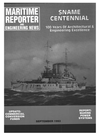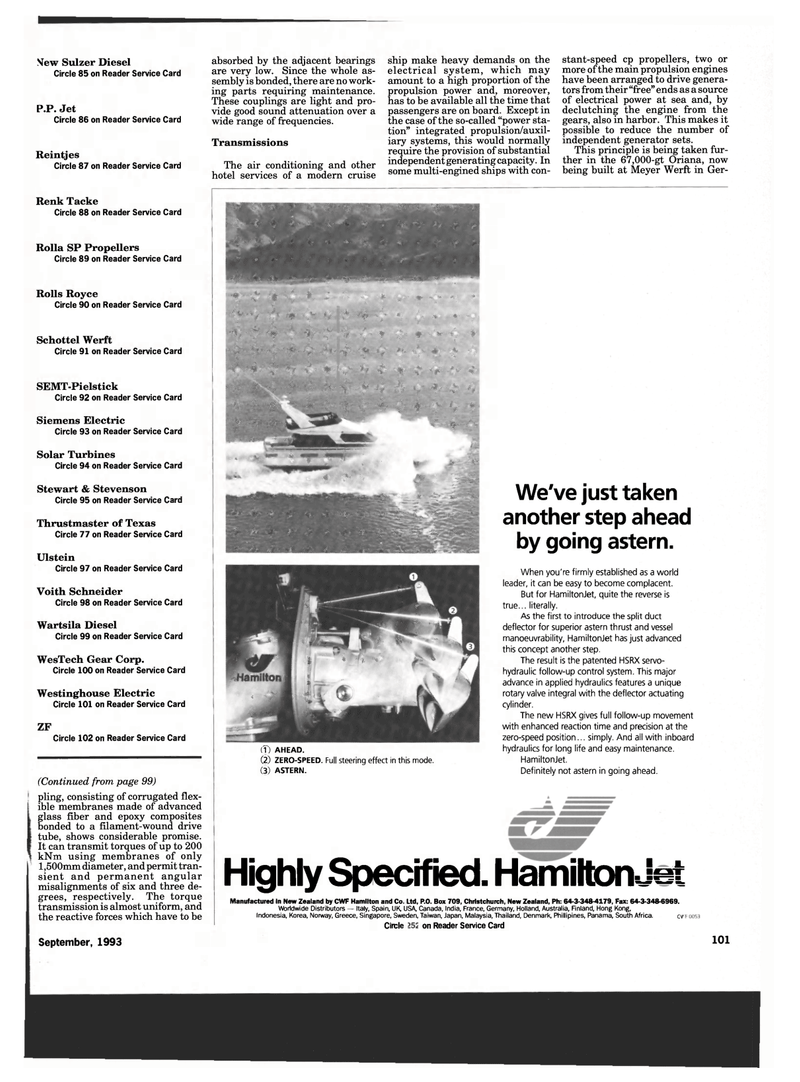
Page 107: of Maritime Reporter Magazine (September 1993)
Read this page in Pdf, Flash or Html5 edition of September 1993 Maritime Reporter Magazine
Vew Sulzer Diesel
Circle 85 on Reader Service Card
P.P. Jet
Circle 86 on Reader Service Card
Reintjes
Circle 87 on Reader Service Card
Renk Tacke
Circle 88 on Reader Service Card
Rolla SP Propellers
Circle 89 on Reader Service Card
Rolls Royce
Circle 90 on Reader Service Card
Schottel Werft
Circle 91 on Reader Service Card
SEMT-Pielstick
Circle 92 on Reader Service Card
Siemens Electric
Circle 93 on Reader Service Card
Solar Turbines
Circle 94 on Reader Service Card
Stewart & Stevenson
Circle 95 on Reader Service Card
Thrustmaster of Texas
Circle 77 on Reader Service Card
Ulstein
Circle 97 on Reader Service Card
Voith Schneider
Circle 98 on Reader Service Card
Wartsila Diesel
Circle 99 on Reader Service Card
WesTech Gear Corp.
Circle 100 on Reader Service Card
Westinghouse Electric
Circle 101 on Reader Service Card
ZF
Circle 102 on Reader Service Card (Continued from page 99) pling, consisting of corrugated flex- ible membranes made of advanced glass fiber and epoxy composites bonded to a filament-wound drive tube, shows considerable promise.
It can transmit torques of up to 200 kNm using membranes of only 1,500mm diameter, and permit tran- sient and permanent angular misalignments of six and three de- grees, respectively. The torque transmission is almost uniform, and the reactive forces which have to be absorbed by the adjacent bearings are very low. Since the whole as- sembly is bonded, there are no work- ing parts requiring maintenance.
These couplings are light and pro- vide good sound attenuation over a wide range of frequencies.
Transmissions
The air conditioning and other hotel services of a modern cruise ship make heavy demands on the electrical system, which may amount to a high proportion of the propulsion power and, moreover, has to be available all the time that passengers are on board. Except in the case of the so-called "power sta- tion" integrated propulsion/auxil- iary systems, this would normally require the provision of substantial independent generating capacity. In some multi-engined ships with con- stant-speed cp propellers, two or more of the main propulsion engines have been arranged to drive genera- tors from their "free" ends as a source of electrical power at sea and, by declutching the engine from the gears, also in harbor. This makes it possible to reduce the number of independent generator sets.
This principle is being taken fur- ther in the 67,000-gt Oriana, now being built at Meyer Werft in Ger- (T) AHEAD. (2) ZERO-SPEED. Full steering effect in this mode. (3) ASTERN.
We've just taken another step ahead by going astern.
When you're firmly established as a world leader, it can be easy to become complacent.
But for HamiltonJet, quite the reverse is true... literally.
As the first to introduce the split duct deflector for superior astern thrust and vessel manoeuvrability, HamiltonJet has just advanced this concept another step.
The result is the patented HSRX servo- hydraulic follow-up control system. This major advance in applied hydraulics features a unique rotary valve integral with the deflector actuating cylinder.
The new HSRX gives full follow-up movement with enhanced reaction time and precision at the zero-speed position... simply. And all with inboard hydraulics for long life and easy maintenance.
HamiltonJet.
Definitely not astern in going ahead.
Highly Specified. Hamilton Jet
Manufactured In New Zealand by CWF Hamilton and Co. Ltd, P.O. Box 709, Chrlstchurch, New Zealand, Ph: 64-3-348-4179, Fax: 64-3-348-6969.
Worldwide Distributors — Italy, Spain, UK, USA, Canada, India, France, Germany, Holland, Australia, Finland, Hong Kong,
Indonesia, Korea, Norway, Greece, Singapore, Sweden, Taiwan, Japan, Malaysia, Thailand, Denmark, Phillipines, Panama, South Africa. cv
Circle 189 on Reader Service Card
September, 1993 101

 106
106

 108
108
